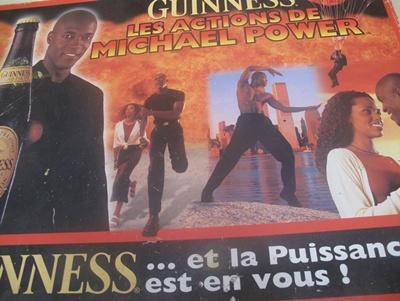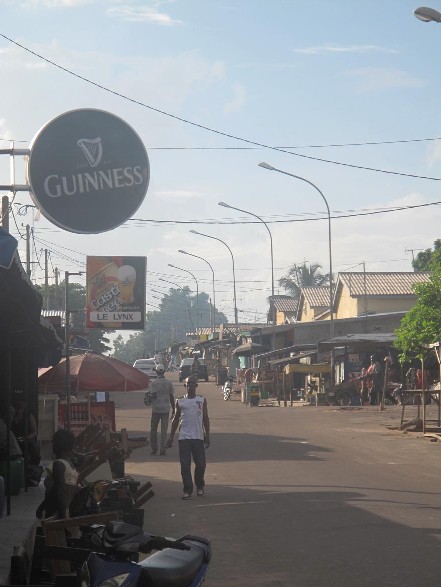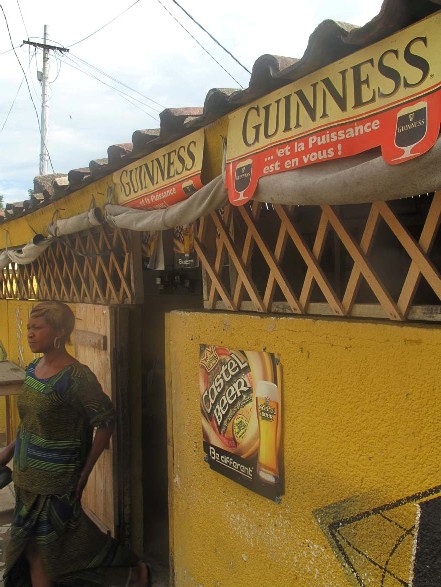African Guinness still 'Good for You' and your Lady friend

African Guinness is marketed as a liquid Viagra. By Tom Rowe.
'Water, water everywhere, and not a drop to drink', said the ancient mariner, lost at sea. This may be akin to how an Irishman adrift in Africa feels, where Guinness abounds, but not the same black stuff as made in St. James Gate.
African Guinness is labeled 'Foreign Extra', a quaint term carried over from when Guinness was produced in Ireland or England and exported to Africa, beginning in 1827. The stout had more alcohol than other beers, and travelled well on the long voyage south.
This stronger brew became the norm here, and is now faithfully reproduced by Guinness breweries in several African countries, most notably Nigeria. They also make a popular non-alcoholic malt flavoured beverage named Malta.
African Guinness sales outstrip Irish figures, the next largest market. It has an alcohol percentage of 7.5 and a more bitter taste than the Irish pint.
 In the interest of thorough journalism, this correspondent sampled a bottle in a bar in Yamoussoukro, the capital of Cote d'Ivoire. As with a previous tasting, four months ago in Timbuktu in Mali, the Guinness of Cote d'Ivoire proved sharp, flat and distinctly lacking in the creamy smoothness of the Irish brew.
In the interest of thorough journalism, this correspondent sampled a bottle in a bar in Yamoussoukro, the capital of Cote d'Ivoire. As with a previous tasting, four months ago in Timbuktu in Mali, the Guinness of Cote d'Ivoire proved sharp, flat and distinctly lacking in the creamy smoothness of the Irish brew.
An acquired taste no doubt. It was certainly enough to put me off acquiring it for another four months.
An Irishman’s reasons for partaking of a pint of plain may vary from simply liking the taste to tradition, price or patriotic duty. But the average African Guinness fan imbibes it for an altogether different reason that would surely not occur to your average man in an Irish snug.
On asking people from Guinea-Bissau to Burkina Faso why they drink Guinness, the answer almost always involves sex. Guinness is regarded as a fortifying drink. A man who drinks a Guinness will be powerful in bed.
Mathiew, a young man drinking the popular Castel larger in Le Lynx bar, laughingly tells me that when the time comes, he has two or three bottles of Guinness and then he is 'ready'.
This perception of Guinness as liquid Viagra is not explicitly referred to in the brewers advertising in Africa, but it is not exactly avoided either. Marketing revolves around single words, usually in English, even in Francophone West Africa. 'Greatness' is the current slogan of a slightly anemic campaign, emblazoned on bridges and billboards all over Abidjan. It is sometimes combined with a reference to the new, more modern design of the Guinness bottle here, or to the 250-year anniversary of Guinness brewing in Dublin. That said, I have not yet met one drinker who knows the connection between Guinness and Ireland. In fact, mention of Ireland is very frequently followed by a question like 'Is that in America?’
'Power' was the previous long-term campaign buzzword, as in 'Guinness...and the Power is in you', or very simply the word 'Power' all on its own.
 The campaign was combined with a very successful gimmick based around 'Les Actions de Michael Power'. Not a farmer from Dungarvan, Michael was in fact some sort of Guinness-drinking special agent, an African James Bond. He was shown on posters, billboards and television escaping from explosions, practicing martial arts, parachuting from great heights and always getting the girl in the end.
The campaign was combined with a very successful gimmick based around 'Les Actions de Michael Power'. Not a farmer from Dungarvan, Michael was in fact some sort of Guinness-drinking special agent, an African James Bond. He was shown on posters, billboards and television escaping from explosions, practicing martial arts, parachuting from great heights and always getting the girl in the end.
So popular was Michael that a full-length movie was made of his exploits. But his mission came to an end when the company decided to change the advertising to emphasise the drop of greatness in everyone, not just Michael Power. But he is still remembered fondly.
Lucien, who I am introduced to specifically because he prefers Guinness to larger simply for the taste, wistfully sighs when I mention the great man.
In Mali, Guinness is drunk by women with milk as an aphrodisiac. In Cote d'Ivoire, warm Guinness was used to treat malaria in the not too distant past.
It is difficult to tell how such legends grow, but with Irish advertising no longer claiming that Guinness is 'Good for You', maybe the company should look into spreading the word about their products’ special properties for men. Perhaps a viral Internet campaign?
Although Irish ladies would remain to be convinced.
